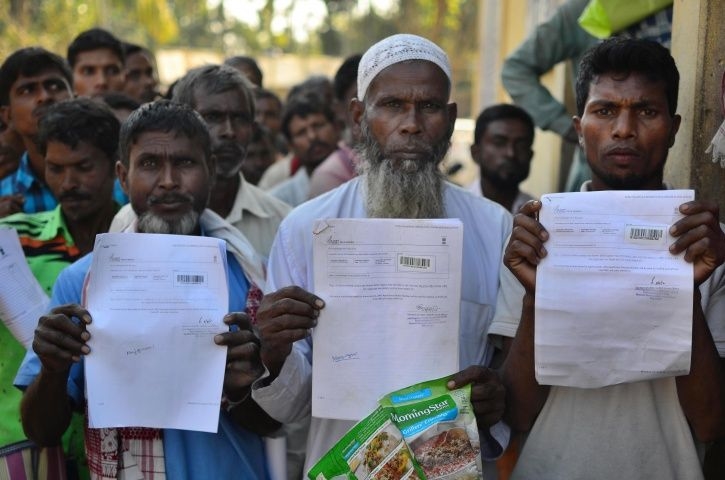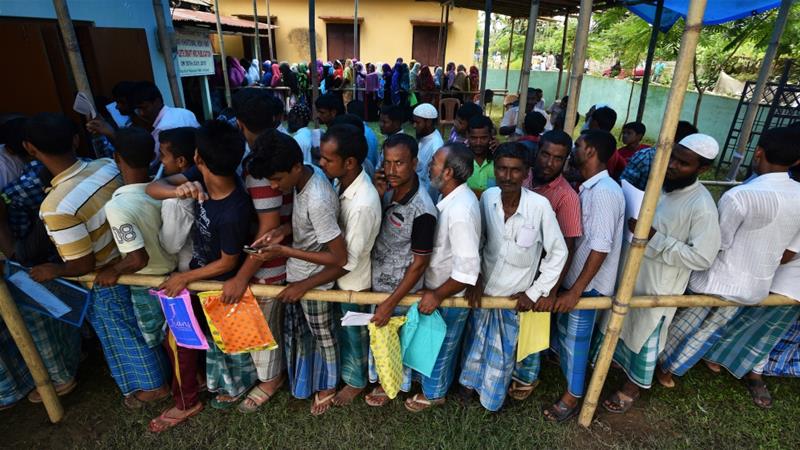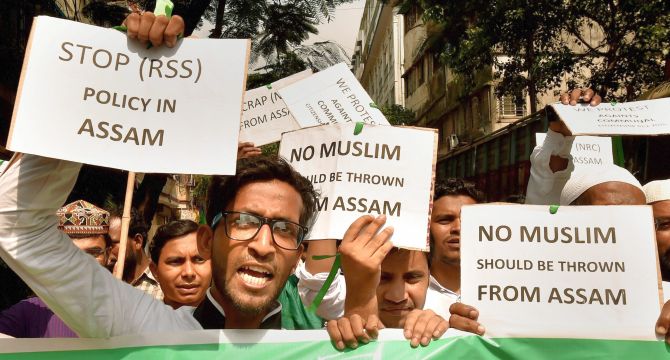‘Assam is boiling’
Human rights defenders struggling to support millions left in immigration limbo by India’s National Register of Citizens
It has been two months since India threw nearly four million people into a desperate scramble to prove their citizenship or risk deportation. The government published a draft of the National Register of Citizens in late July and the effects were immediate: millions excluded from the list were made to produce evidence of their legitimate claims, security forces were put on alert to quell potential violence in a region with a history of persecuting ethnic minorities, and at least one thousand people are still being held in criminal jails serving as immigration detention centres.

Source: NewsClick
The sudden statelessness of millions received much international attention following the release of the July draft. But on the ground, human rights defenders (HRDs) say threats are increasing against those helping victims prepare citizenship documentation and providing legal aid. Funding for legal representation is critically needed. Only a small group of human rights lawyers are working on these cases.
“As a lawyer I’m dealing with scores of cases.” HRD Aman Wadud told Front Line Defenders. “At the end of the day, these are Indian citizens – genuine Indian citizens with all the proper documents that are being accused of being illegal immigrants.”
Aman explained that the volume and nature of the cases is negatively impacting his psycho-social health. “Talking to the family members, dealing with their cases every day, has taken a huge toll on me. I am almost fighting depression now. Because whichever case I come across is a gross violation of natural justice, despite having all documents people are being declared foreigners, rendered stateless. If I take a break that will hamper my work and affect my clients.”
HRDs working on these cases are also receiving threats from authorities and anonymous online harassment for supporting people rendered stateless by the Registry publication. “Because I speak up I do face backlash. I have been told by authorities to ‘be careful’. I have been threatened with a criminal case and contempt of court. I never take these threats seriously because I know I have never said or done anything contrary to the law. I am being hounded by powerful people who don’t want the world to know the truth about Assam.”
According to Aman, large fractions of the overall population in Assam are very poor or illiterate and few possess the documents required to prove their citizenship in communities where there is no culture of documentation for births and deaths. There is also concern that where people reside in high flood risk areas, even if records are made and kept, they are often destroyed.
“It’s a livelihood issue.”
Volunteers are giving their time to fill out forms, prepare documents and deliver them to government offices, but more hands are needed. These tasks can take hours out of the work day, which many people left off the register cannot afford to lose. As a result, some people left off draft versions of the NRC were forced to make a choice between their job and taking time to prepare and deliver their documents properly.
“It’s a livelihood issue,” explains the Front Line Defenders Protection Coordinator for Asia, who conducted a research mission to Assam shortly before the release of the draft of the NRC in July. “At the same time, the main issue for HRDs is capacity. For community leaders and lawyers, capacity building in documentation as well as doing this work with safety and security. Second, they need more people with them.”
Indefinite detention
The NRC released in July was officially a draft version, with the so-called ‘final list’ released in September. Those left off the final list have the option of submitting their documents for inclusion until 23 November, after which the only recourse is appealing their case before Foreigner Tribunals.
Assam’s Border Security Force (BSF), have detained people unable to demonstrate proof of citizenship, despite the fact that they are still legally eligible to appeal their status. Detainees are being held in any of six criminal incarceration facilities across Assam.
“There are no guidelines, no rules and no regulations to regulate detainees in detention centres,” explains Aman. “They do not have right to parole, the regular jail rules do not apply to them. They’re not given the minimum wage to work, they have no recreation, nothing. The detention centres are slowly and steadily getting very crowded.”

Source: Reuters
A terminal order for many of those detained has already been upheld in court. This means they are due for deportation to Bangladesh. However, there is currently no formal deportation agreement with Bangladesh, which leaves them in limbo – stateless and without status. This could result in people remaining in criminal jails serving as improvised and unregulated immigration detention centres, indefinitely.
“If the government does not have a policy, if the Supreme Court does not set-up any guidelines or regulations,” explains Aman, “then these inhumane conditions will persist. And people will be indefinitely detained.”
Some reports describe family members – including children – being separated because one member is on the NRC and another is not and subsequently detained. Another growing point of concern for HRDs in Assam is the potential for land grabbing and property theft while people are in detention.
“If the government does not have a policy, if the Supreme Court does not set-up any guidelines or regulations, then these inhumane conditions will persist. And people will be indefinitely detained.”
Historic ethnic tensions
The majority of the four million, now struggling to compile personal documents to prove they are not illegal immigrants, are Muslim and ethnically Bengali people who have lived in Assam for generations. They face prejudice from both the non-Bengali Indian and Hindu and Indigenous Assamese communities.
The NRC updates were an election promise from the right-wing Hindu Nationalist political party Bharatiya Janata Party (or BJP) during India’s last federal election, aimed at addressing the so-called problem of illegal migration into Assam. Assam is the only state in the country that has an NRC.
“There has been occasional tension between indigenous Assamese and Bengali people, but the tension mounted when the BJP came to power,” says Front Line Defenders Regional Protection Coordinator for Asia.
According to Aman, the idea of a national register was initially welcomed by some minorities, particular the Bengali community, because it represented an opportunity to finally put to rest allegations against them regarding their immigration status.
“Bengalis have always been branded ‘illegal immigrants’,” says Aman. “They saw the NRC as a mechanism to end the politicization of illegal migration.” However, the result has included systemic discrimination, mass detentions and threats against HRDs like Aman.

Source: PTI
Many members of the Bengali minority communtiy in Assam have lived in Assam for generations and do not have status in Bangladesh, either. Aman fears many of these will “surely be rendered stateless” following the November deadline to file their claims for inclusion in the NRC
With the 23 November only about six weeks away and millions still without status, the work of HRDs like Aman is more critical than ever. HRDs preparing citizenship documents and delivering them to government offices are defending whole communities from displacement, deportation or indefinite immigration detention. Their work, their well-being and their capacity to continue is what will protect people who have lived their entire lives in Assam from becoming stateless.
Tanya Singh is the Research and Training Fellow for Asia.
Haseena Manek is the Web Editor and Communications Fellow.
